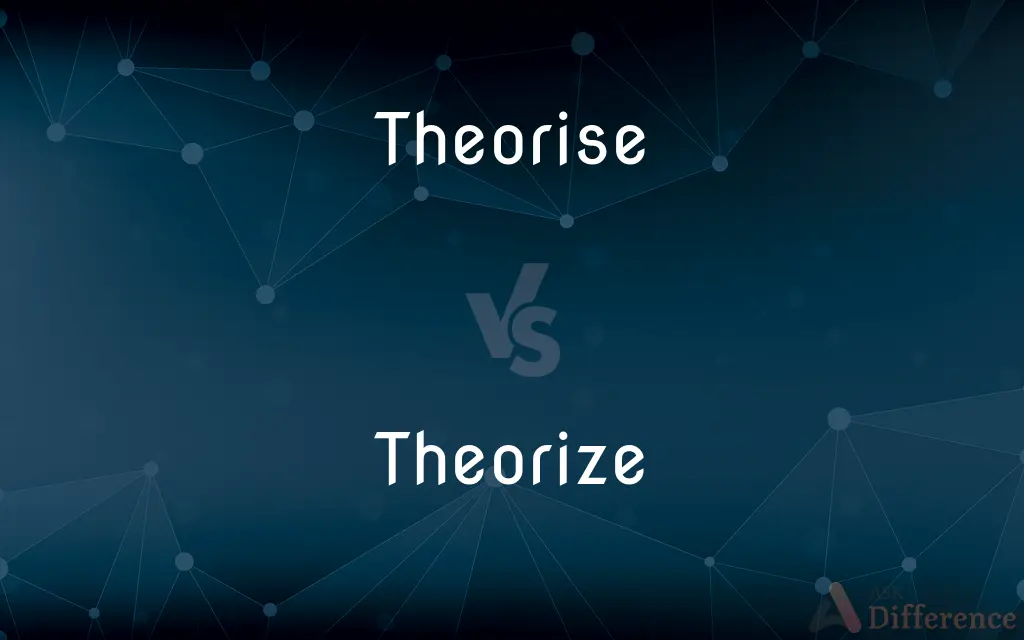Theorise vs. Theorize — What's the Difference?
By Maham Liaqat & Urooj Arif — Updated on March 12, 2024
Theorise and theorize are variants spelling the same concept of forming theories, where "theorise" is preferred in British English, while "theorize" is used in American English.

Difference Between Theorise and Theorize
Table of Contents
ADVERTISEMENT
Key Differences
Theorise is the British English spelling for the action of formulating theories or hypotheses based on speculative or abstract reasoning. It emphasizes the process of creating explanations or models to understand phenomena. On the other hand, theorize is the American English variant of the same concept. Both terms share the same pronunciation and are used in academic and scientific contexts to describe the development of theoretical frameworks or explanations. However, the preference for one spelling over the other often depends on the regional or national standards of English being used. In academic writing, it is important to maintain consistency with either British or American English conventions throughout a document.
While theorise might appear in journals, books, or articles produced in the United Kingdom or countries following British English norms, theorize is typically found in American publications. This distinction in spelling reflects the broader differences between British and American English, which include variations in spelling, grammar, and vocabulary. Despite these differences, the meaning and use of theorise and theorize remain the same across English-speaking regions, demonstrating the flexibility and diversity of the English language.
In the context of educational systems, students and educators in the UK are more accustomed to seeing and using the spelling "theorise" in their studies and academic work. Whereas, in the United States, "theorize" is the standard spelling taught in schools and used in academic papers. This variation in spelling does not impact the comprehension or the academic rigor of discussions involving the formation of theories.
In digital and global communication platforms, the intermixing of British and American English has led to a more fluid use of both spellings. Online articles, forums, and academic databases may contain both "theorise" and "theorize," depending on the origin of the content or the preference of the author. This demonstrates the adaptability of English speakers and writers in navigating spelling differences while maintaining clear and effective communication.
While the choice between theorise and theorize primarily hinges on regional spelling conventions, it has little effect on the academic and intellectual processes involved in theory development. Both spellings are equally valid and respected within the global academic community, underscoring the rich diversity of the English language and its ability to accommodate regional variations without compromising on clarity or meaning.
ADVERTISEMENT
Comparison Chart
Spelling Variation
British English
American English
Usage
Preferred in the UK and Commonwealth countries
Predominantly used in the United States
Pronunciation
Identical to Theorize
Identical to Theorise
Context
Academic, scientific, and formal writing
Academic, scientific, and formal writing
Global Communication
Used in international platforms adhering to British standards
Used in platforms with American English standards
Compare with Definitions
Theorise
To speculate or conjecture without firm evidence.
Philosophers often theorise about the nature of existence.
Theorize
To develop or conjecture theories based on data or observations.
Scientists theorize that dark matter makes up most of the universe's mass.
Theorise
To engage in the process of developing theoretical frameworks.
The researcher theorised a new approach to understanding social behaviors.
Theorize
To apply abstract principles to analyze or solve problems.
Urban planners theorize ways to create more sustainable cities.
Theorise
To form a theory or set of theories about something.
Scientists theorise about the origins of the universe through various models.
Theorize
To formulate explanations or models theoretically.
The physicist theorized a new particle that could explain quantum anomalies.
Theorise
To apply theoretical concepts to practical situations.
Economists theorise that market trends can predict financial crises.
Theorize
To propose theoretical concepts for investigation.
Researchers theorize a link between stress and immune system function.
Theorise
To hypothesize or propose a theory.
The biologist theorised a connection between climate change and species migration.
Theorize
To engage in speculative reasoning or hypothesizing.
Psychologists theorize about the impact of childhood experiences on elder's behavior.
Theorise
Standard spelling of theorize
Theorize
To formulate theories or a theory; speculate.
Theorise
To believe especially on uncertain or tentative grounds;
Scientists supposed that large dinosaurs lived in swamps
Theorize
To propose a theory about.
Theorize
To formulate a theory, especially about some specific subject.
Theorize
To speculate.
Theorize
To form a theory or theories; to form opinions solely by theory; to speculate.
Theorize
To believe especially on uncertain or tentative grounds;
Scientists supposed that large dinosaurs lived in swamps
Theorize
Construct a theory about;
Galileo theorized the motion of the stars
Theorize
Form or construct theories;
He thinks and theorizes all day
Common Curiosities
Why do some words have different spellings in British and American English?
Historical, cultural, and linguistic developments have led to variations in spelling, pronunciation, and usage between British and American English.
Is theorize acceptable in British English academic writing?
British English prefers "theorise," but "theorize" can be understood. Consistency with British spelling is recommended in formal writing.
Is there a difference in meaning between theorise and theorize?
No, theorise and theorize have the same meaning and usage, differing only in spelling according to British and American English conventions.
Can I use theorise in American English?
While it's not the preferred spelling, it's understood; however, for consistency, American English favors "theorize."
Can switching between theorise and theorize in a document affect its quality?
Yes, consistency in spelling is important for professionalism and readability, especially in formal or academic documents.
Do theorise and theorize have the same pronunciation?
Yes, both spellings are pronounced the same way despite their different spellings.
In which fields are theorise and theorize most commonly used?
They are widely used in fields such as science, philosophy, psychology, and any discipline that involves the formation and testing of theories.
Is there a preference for theorise or theorize in scientific journals?
The preference is based on the journal's country of publication or its specified style guide, with British journals preferring "theorise" and American journals "theorize."
How has globalization affected the use of British and American English spellings like theorise and theorize?
Globalization has led to increased exposure to both forms, making English users more accepting of variation, though specific contexts still prefer consistency.
Are there other examples of British and American English spelling differences similar to theorise and theorize?
Yes, such as "organise" vs. "organize" and "colour" vs. "color."
How can I know when to use theorise or theorize?
Consider the audience or the regional spelling standards of the publication or institution for which you are writing.
Does the use of theorise over theorize impact the credibility of research?
No, the credibility of research is not affected by the choice of spelling but by the quality and rigor of the research itself.
Can using the wrong variant of theorise/theorize in a paper lead to penalization?
In academic and professional settings, consistency is key. While unlikely to be heavily penalized, it's best to adhere to the preferred spelling standard.
Share Your Discovery

Previous Comparison
Vapid vs. Vacuous
Next Comparison
Infinite vs. InfinityAuthor Spotlight
Written by
Maham LiaqatCo-written by
Urooj ArifUrooj is a skilled content writer at Ask Difference, known for her exceptional ability to simplify complex topics into engaging and informative content. With a passion for research and a flair for clear, concise writing, she consistently delivers articles that resonate with our diverse audience.
















































